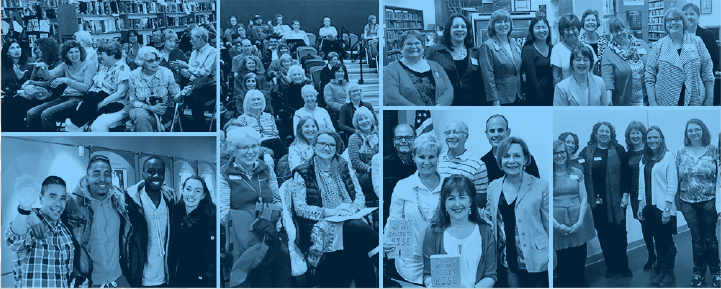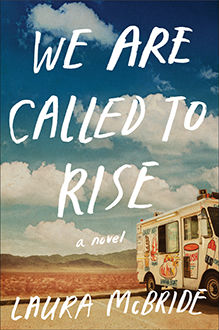
We Are Called to Rise
by Laura McBrideReading Group Guide
This reading group guide for We Are Called to Rise includes an introduction, discussion questions, ideas for enhancing your book club, and a Q&A with author Laura McBride. The suggested questions are intended to help your reading group find new and interesting angles and topics for your discussion. We hope that these ideas will enrich your conversation and increase your enjoyment of the book.
Introduction
We Are Called to Rise is told in four distinct voices—an immigrant boy whose family is struggling to assimilate, a middle-aged housewife coping with an imploding marriage and a troubled son, a social worker at home in the darker corners of Las Vegas, and a wounded soldier recovering from an injury he can’t remember getting—voices that come together around a tragedy changing those four lives forever. Each of the four struggles with ramifications of the choices that have led to this event, and all four discover that our lives are connected and we are responsible for one another.
Topics & Questions for Discussion
1. Which of the three main narrators—Bashkim, Avis, Luis, was the most effective?
2. The setting, Las Vegas, is so pervasive it is almost a character in its own right. Talk about how the author uses the dry desert town as a backdrop and as an integral piece of the story. Discuss the juxtaposition of glamorous casinos with the ordinary suburban lives so many of the characters lead. How does the backdrop of the world of gambling, sex, and money impact the characters in their everyday lives? Do you think this story could have taken place anywhere else?
3. The landscape of Nevada is compared several times to that of Iraq and Afghanistan. What other connections do you see between the Western state and the war zones of the East that affect so many of the characters?
4. Throughout the story Avis struggles with how much responsibility she has for her son’s actions. How does her own childhood impact the parenting decisions she makes? What about the loss of Emily? How much blame does Avis bear for what has happened to Nate throughout his life? When are parents accountable for the actions of their children?
5. Luis carries guilt for not protecting his partner, Sam, and also for accidentally shooting a boy in Iraq; when we first meet him, he is recovering from a self-inflicted gunshot wound. He suffers both mentally and physically, but which bothers him more? Is his recovery more about healing his body or his soul? How does the act of writing to Bashkim help him with both?
6. How does seeing events through Bashkim’s eyes influence our understanding of the story? Do you find Bashkim’s narrative of the novel’s more serious events to be reliable? Why or why not?
7. Roberta is, in many ways, the narrator we know the least about. She has the fewest sections, and the parts of the story she narrates are almost entirely focused on other people. How is seeing this story through the eyes of a largely unknown character different from a character’s life story that is more fleshed out?
8. Avis is heartbroken over her husband’s infidelity and desire for divorce. But we find out that she, too, has been tempted, and that she even secretly kissed another man. When Jim says that Darcy was somebody he could talk to, somebody who “helped him think about things,” Avis wonders, What does that have to do with ending our marriage? Is she questioning why Jim thought he couldn’t just have a woman friend? Or is she saying that she’d prefer to go on not knowing that Darcy and Jim are now lovers? What do you think she means by this question? (Would you want to know if your partner were cheating?)
9. We’re more than halfway through the book before we begin to see how each of the characters’ stories intersects with the others. What is the narrative impact of seeing each story unfold individually? What are the benefits of this story structure? What are the drawbacks? Do you think the way the stories come together is effective?
10. At the final court proceeding the judge says, “If, sometimes, an unspeakable horror arises from the smallest error, I choose to believe that it’s possible for an equally unimaginable grandeur to grow from the tiniest gesture of love. . . . Great terror is the result of a thousand small but evil choices, and great good is the outcome of another thousand tiny acts of care.” Do you agree with this?
11. “Things happen to us that are more than we can take. And we break. We break for a moment, for a while. But the break is not who we are.” These words are spoken to Luis by Dr. Ghosh. Do you agree that the break is not who we are? Or do you believe that what we do when we break shows who we truly are? How do you see each of the main characters reflected in this statement?
12. The title of this novel is quoted from an Emily Dickinson poem—the epigraph at the beginning of the book. What do you make of the poem? How do you see each of the characters in this story rising? Do you see the title as ultimately optimistic? Do you see the book the same way?
13. Anton Chekhov famously said that if a gun appears in the first act of a play, that gun must go off before the end of the story. This book opens with the discovery of a gun, but that gun is tossed away partway through the book. Guns, however, are an integral part of the plot. Discuss the role of guns in this story, both in actuality and as metaphor.
14. What do you make of the judge’s decision to place Bashkim and Tirana with Graciela and Luis? Does that seem realistic to you? Why or why not? Do you think they would have been better off with their father? What solution would you have chosen for these children?
Enhance Your Book Club
1. There are dozens of movies set in Las Vegas, old classics such as Viva Las Vegas, the original Ocean’s Eleven, and Diamonds are Forever, and also contemporary favorites such as Leaving Las Vegas, Fear and Loathing in Las Vegas, Showgirls, and The Hangover. View one of the films together and discuss how the unique setting influences the story.
2. Both Nate and Luis suffer from forms of post-traumatic stress disorder or combat stress after serving in the military. This is a common response to war, though many soldiers returning home from war are ashamed to seek help for the psychological scars they carry from their time serving. Research one of the organizations that aims to help these servicemen and women, such as The Soldiers Project (http://www.thesoldiersproject.org/) and discuss how you could help as a group.
3. The Ahmeti family members are refugees from Albania, a country many Americans know very little about. Do some research on Albania’s history, geography, and culture, and discuss their effect on how Sadik, Arjeta, and even Bashkim understand the world they now live in.

